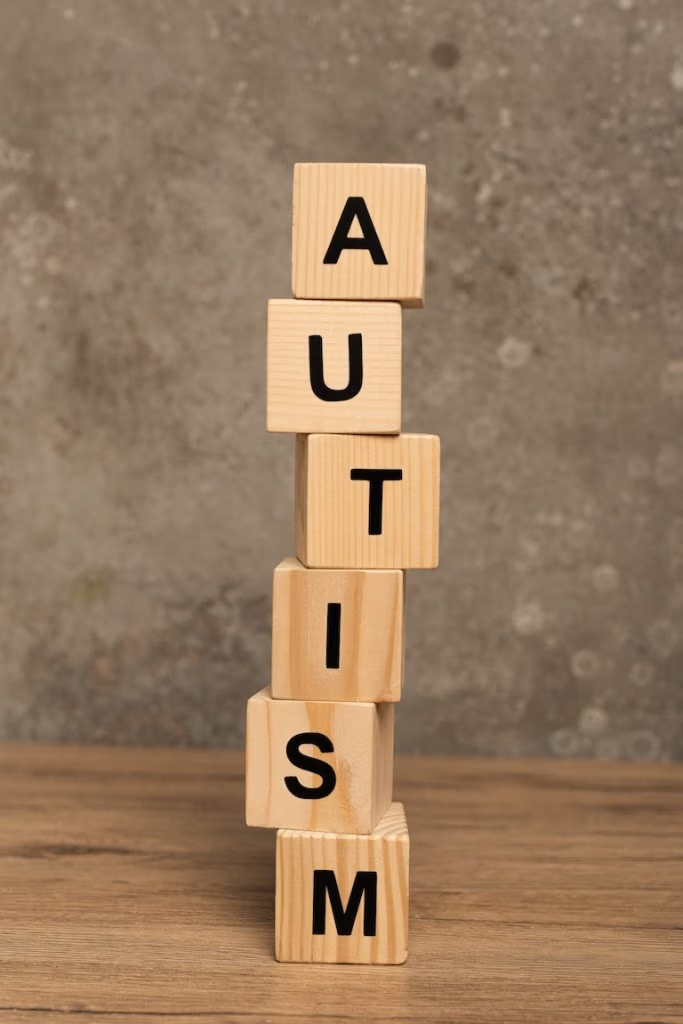Autism Spectrum Disorder (ASD)
Autism Spectrum Disorder (ASD) is a developmental condition that affects how a person communicates, interacts socially, and behaves. It is called a “spectrum” because it encompasses a wide range of symptoms, skills, and levels of ability. Individuals with ASD may have mild challenges or significant difficulties that impact their daily lives.
What does it look like?
Symptoms of ASD often appear early in development, typically between 12 and 24 months of age. Boys are about four times more likely to be diagnosed with ASD than girls.
Here’s how symptoms might manifest at different ages:
- Early Childhood (12-24 months): May not respond to their name, limited eye contact, lack of social smiling, repetitive behaviors (like rocking or hand-flapping), delayed language development.
- Preschool (ages 3-5): Difficulty with social interaction and communication, limited imaginative play, preference for solitary activities, repetitive behaviors, sensory sensitivities.
- School Age (ages 6 and up): Challenges with social skills and understanding social cues, difficulty making friends, may have intense interests or fixations, may struggle with changes in routine.
Prevalence:
- Global: The global prevalence of ASD is estimated to be around 1 in 160 children, which translates to approximately 15 million children.
- Egypt: While exact figures are limited, studies suggest that the prevalence of ASD in Egypt is similar to the global average, affecting an estimated 140,000 children.
- UAE: Research indicates that the prevalence of ASD in the UAE is around 1 in 100 children, affecting approximately 10,000 children.
- KSA: Studies have found that the prevalence of ASD in Saudi Arabia is approximately 1 in 150 children, impacting an estimated 40,000 children.
How Can Psychiatry Help?
Psychiatrists play a vital role in the diagnosis and management of ASD. Here’s how:
- Early Diagnosis: Early diagnosis is key to accessing timely intervention and support. Psychiatrists use a variety of methods to diagnose ASD, including:
- Developmental Screening: Checking for developmental milestones and identifying any areas of concern.
- Comprehensive Evaluation: In-depth assessment of the child’s communication, social interaction, behavior, and developmental history.
- Autism Diagnostic Observation Schedule (ADOS): A standardized assessment tool used to observe and assess social and communication behaviors.
- Individualized Treatment Plans: Treatment for ASD is tailored to each child’s unique needs and strengths. This may include:
- Therapy: Behavioral therapies, such as Applied Behavior Analysis (ABA), can help children with ASD develop social and communication skills, reduce challenging behaviors, and learn new skills.
- Speech Therapy: To improve communication skills, including verbal and nonverbal communication.
- Occupational Therapy: To develop daily living skills, sensory integration, and motor skills.
- Parent Training: Parents learn strategies to support their child’s development, manage challenging behaviors, and advocate for their child’s needs.
- Medication: While there is no medication that cures ASD, medication can be helpful in managing specific symptoms, such as anxiety, hyperactivity, or sleep problems.
Take the First Step Today
Take the first step toward better understanding and support for Autism Spectrum Disorder (ASD). Whether you or your loved one needs guidance, treatment options, or personalized care, we’re here to help. Call today to schedule an appointment and let us work together to create a brighter future. Your journey starts with one call, don’t wait!
